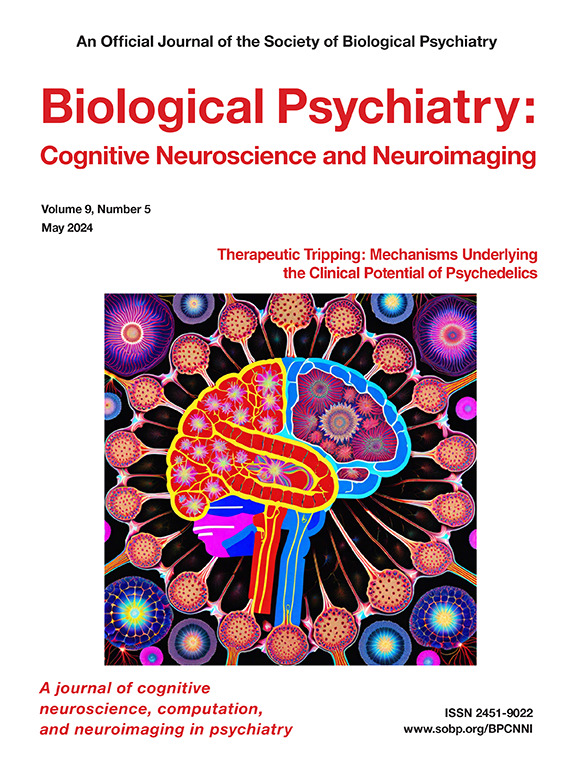在一个纵向青年群体中,与药物使用相关的社会决策改变。
IF 5.7
2区 医学
Q1 NEUROSCIENCES
Biological Psychiatry-Cognitive Neuroscience and Neuroimaging
Pub Date : 2024-10-01
DOI:10.1016/j.bpsc.2024.06.014
引用次数: 0
摘要
背景:药物使用失调(SUD)与严重的负面社会和健康相关结果有关。越来越多的证据表明,长期使用药物与社会交往行为的改变有关,而社会交往行为的改变很可能导致药物滥用症的恶性循环。然而,这些社会问题是仅仅源于环境因素,还是也源于药物使用本身--换句话说,是先天性的,还是药物诱发的,人们对此知之甚少:方法:我们在 20 岁时药物使用率较高的城市年龄群组(n=1,002)中,研究了药物使用者在 9 年内(从 11 岁到 20 岁)行为改变背后的因果关系。我们利用毒物毛发分析确定常见的药物使用模式,通过激励性游戏研究行为改变,并利用不同年龄段的教师评估来确定与药物使用相关的社会交往障碍背后的原因和影响:结果:我们发现,阿片类药物和兴奋剂使用者的亲社会行为比非使用者有所减少,尤其是在人际信任和观点采纳方面(例如,他们信任他人的可能性要低 50%)。我们的纵向分析表明,处方阿片类药物的非医疗使用与社会行为受损之间存在因果关系,而兴奋剂使用者的社会行为受损似乎只是部分先兆。此外,女性受阿片类药物使用的影响往往比男性更严重。然而,在吸食大麻或摇头丸的青壮年中没有发现行为改变:结论:阿片类药物等高度成瘾物质会损害使用者的社交行为,破坏基本的人际交往,助长药物使用和社会隔离的恶性循环。本文章由计算机程序翻译,如有差异,请以英文原文为准。
Substance Use–Related Alterations of Social Decision Making in a Longitudinal Cohort of Young Adults
Background
Substance use disorders are associated with severe negative social and health-related outcomes. Evidence has accumulated that long-term substance use is associated with alterations in social interaction behavior, which likely contributes to the vicious cycle of substance use disorder. However, little is known about whether these social problems originate from contextual factors only or also from the substance use itself—in other words, if they are predisposed or substance induced.
Methods
We studied the causation behind behavioral alterations of substance users over a 9-year period (ages 11–20 years) in an urban age cohort (N = 1002) with a high prevalence of substance use at age 20. We identified common substance use patterns using toxicological hair analysis, examined behavioral alterations with incentivized games, and used teacher assessments across different ages to determine the causes and effects that underlie substance use–related impairments in social interaction.
Results
We found that opioid and stimulant users showed reduced prosocial behavior compared with nonusers, particularly in interpersonal trust and perspective taking (e.g., they were approximately 50% less likely to trust others). Our longitudinal analyses suggest a causal relationship between the nonmedical use of prescription opioids and impaired social behavior, whereas impairments among stimulant users seem to be partially predisposed. Moreover, women tended to be more severely affected by opioid use than men. However, no behavioral alterations were found among young adult cannabis or ecstasy users.
Conclusions
Highly addictive substances such as opioids can impair users’ social behavior by undermining fundamental human interaction, thereby fueling a vicious cycle of substance use and social isolation.
求助全文
通过发布文献求助,成功后即可免费获取论文全文。
去求助
来源期刊

Biological Psychiatry-Cognitive Neuroscience and Neuroimaging
Neuroscience-Biological Psychiatry
CiteScore
10.40
自引率
1.70%
发文量
247
审稿时长
30 days
期刊介绍:
Biological Psychiatry: Cognitive Neuroscience and Neuroimaging is an official journal of the Society for Biological Psychiatry, whose purpose is to promote excellence in scientific research and education in fields that investigate the nature, causes, mechanisms, and treatments of disorders of thought, emotion, or behavior. In accord with this mission, this peer-reviewed, rapid-publication, international journal focuses on studies using the tools and constructs of cognitive neuroscience, including the full range of non-invasive neuroimaging and human extra- and intracranial physiological recording methodologies. It publishes both basic and clinical studies, including those that incorporate genetic data, pharmacological challenges, and computational modeling approaches. The journal publishes novel results of original research which represent an important new lead or significant impact on the field. Reviews and commentaries that focus on topics of current research and interest are also encouraged.
 求助内容:
求助内容: 应助结果提醒方式:
应助结果提醒方式:


